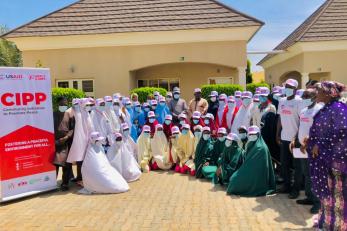Mercy Corps and WeGirls Foundation hold event to boost digital access for girls

Mercy Corps Nigeria through the USAID funded Community Initiatives to Promote Peace (CIPP) program commemorates this year 2021’s International Day of the Girl Child in collaboration with WeGirls Development Foundation.
On October 11, 2021, Mercy Corps provided a unique platform for adolescent girls to join their peers around the world to celebrate this year’s International Day of the Girl Child, with the global theme, “Digital generation. Our generation” at Katsina Tourist lodge conference hall, Katsina state.
The initiative was designed to facilitate actions towards advancing gender equality and addressing barriers that girls face; the inclusion of girls in digital transformation; and catching them young for early warning and early response as well as to strengthen their engagement in addressing hate and false speeches, promote peace through campaigns and outreaches on digital platforms to sustain peace.
In Nigeria, females make up 49.2% of the entire population and the country has one of the youngest populations in the world. To achieve inclusive, peaceful, and sustainable development, enabling environment must be provided for females to exercise their fundamental rights.
Although the COVID‑19 crisis has accelerated digital platforms for learning, connecting, and interacting, some 2.2 billion people below the age of 25 still do not have internet access at home. More worrisome, is the fact that girls are less likely than boys to gain access to or use digital technologies. Research conducted by Mercy Corps shows that the gender gap for internet users in the least developed countries grew to 43% in 2019 and the weaponization of social media is shifting peace and conflicts in the world’s fragile states.
Speaking on the importance of girls education, Ndubisi Anyanwu, the Country Director, Mercy Corps Nigeria said, “As an organization, Mercy Corps strives to address and mitigate gender dynamics that perpetuate and exacerbate conflict by engaging with men, women, boys, and girls in all aspects of our work to alleviate poverty, suffering and address root causes of violent conflicts. It is critical to empower and equip girls to leverage powerful technology tools to counter negative campaigns including hate speech and misinformation that can potentially fuel violent conflict and accelerate the achievement of SDG 5 for Gender Equality.”
Adding to digital innovations implemented by the organization, the Deputy Chief of Party, Sani Suleiman noted, “There is a recognition of the significance of the use of digital technology as a tool for peacebuilding and amplifying voices that challenge harmful practices such as gender-based violence and discrimination. Therefore, the digital gender divide in poor and rural communities is a threat to the advancement of gender equality and girls’ meaningful participation in decisions that affect their lives,” he said.
“More than ever, there is a need to promote digital inclusion and literacy by working together with diverse stakeholders and mobilizing resources to support girls to stay connected and empowered in the growing digitalized world,” Ndubisi added.
This is a call to action for strategic actions to be taken to bridge the digital gender divide and ensure inclusive digital transformation. This will not only ensure that girls are able to access tech-related jobs and earnings, but also enable their access to digital technology in a safe and secure manner.
The time to push for a digital revolution for all to harness the untapped potentials of girls in promoting peace and building bridges along ethnoreligious divides through their active participation in digital platforms is now. Girls are leaders and should be supported to fully engage in digital spaces and use technological innovations to promote gender-responsive peace and security.